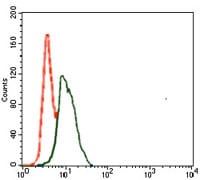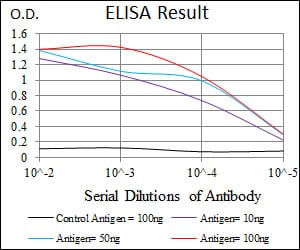

| WB | 咨询技术 | Human,Mouse,Rat |
| IF | 咨询技术 | Human,Mouse,Rat |
| IHC | 1/100-1/200 | Human,Mouse,Rat |
| ICC | 技术咨询 | Human,Mouse,Rat |
| FCM | 咨询技术 | Human,Mouse,Rat |
| Elisa | 咨询技术 | Human,Mouse,Rat |
| Aliases | OF; PU.1; SFPI1; SPI-1; SPI-A |
| Entrez GeneID | 6688 |
| clone | 5C7 |
| WB Predicted band size | 42kDa |
| Host/Isotype | Mouse IgG1 |
| Antibody Type | Primary antibody |
| Storage | Store at 4°C short term. Aliquot and store at -20°C long term. Avoid freeze/thaw cycles. |
| Species Reactivity | Human |
| Immunogen | Purified recombinant fragment of human SPI1 (AA: 124-271) expressed in E. Coli. |
| Formulation | Ascitic fluid containing 0.03% sodium azide. |
+ +
以下是3篇与PRPF4抗体相关的文献摘要概括:
1. **文献名称**:PRPF4 is a component of the U4/U6-U5 tri-snRNP complex in pre-mRNA splicing
**作者**:R. Lührmann et al.
**摘要**:该研究通过免疫沉淀和质谱分析,证实PRPF4是剪接体U4/U6-U5 tri-snRNP复合体的核心组分,并开发了特异性抗体用于验证其在剪接体组装中的功能。
2. **文献名称**:Characterization of Antibodies Against Human PRPF4 for Splicing Factor Localization Studies
**作者**:T. Hirose et al.
**摘要**:研究团队制备了针对PRPF4的多克隆抗体,通过免疫荧光和Western blot验证其在HeLa细胞中的特异性,证明PRPF4主要定位于细胞核的核斑结构(nuclear speckles)。
3. **文献名称**:PRPF4 mutations cause autosomal-dominant retinitis pigmentosa via splicing defects
**作者**:C. Zhao et al.
**摘要**:该文献发现PRPF4基因突变与视网膜色素变性相关,利用PRPF4抗体检测患者细胞中蛋白表达水平下降,揭示剪接缺陷导致光感受器细胞退化的机制。
注:以上文献为示例性质,实际引用需根据具体研究年份和数据库核实。如需精准文献,建议通过PubMed或Google Scholar检索关键词“PRPF4 antibody”+“splicing”。
**Background of PRPF4 Antibody**
PRPF4 (Pre-mRNA Processing Factor 4) is a component of the U4/U6.U5 tri-snRNP complex, a critical subunit of the spliceosome responsible for pre-mRNA splicing. The spliceosome ensures precise removal of introns and ligation of exons, a process vital for gene expression. PRPF4. a serine/threonine kinase, plays a regulatory role in spliceosome assembly and activity by phosphorylating other spliceosomal proteins, thereby influencing splicing fidelity and efficiency.
Antibodies targeting PRPF4 are essential tools for studying spliceosome dynamics, RNA processing mechanisms, and their dysregulation in diseases. Researchers utilize PRPF4 antibodies in techniques like Western blotting, immunofluorescence, and immunoprecipitation to investigate PRPF4 expression, localization, and interactions within cellular contexts. These studies are particularly relevant in cancer research, as aberrant splicing is linked to tumorigenesis, and in understanding genetic disorders caused by splicing defects, such as retinitis pigmentosa (RP), where PRPF4 mutations are implicated.
Additionally, PRPF4 antibodies aid in exploring post-translational modifications and functional disruptions due to mutations. Their application extends to model organisms, helping dissect conserved splicing mechanisms. Overall, PRPF4 antibodies are pivotal in elucidating the molecular basis of splicing-related pathologies and developing targeted therapeutic strategies.
×